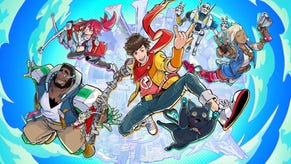GameCity's Iain Simons
The festival organiser on exposing the humanity at the core of the games industry
It's difficult for me to say, because I don't make games, so my understanding of the economies involved is simplistic at best - it's not what I do. From the point of view of someone who reads a lot about them, and obviously consumes all of the press around them... I don't necessarily think that they're a red herring, I just think that it consumes too much of the policy debate around what games are.
There's only so much bandwidth that the non-specialist press will give to videogames, so let's assume that about 50 per cent of that is going to be about Manhunt, Medal of Honor type stuff, reactionary stuff, if the rest is left over to tax breaks then I think that's a bit of a problem. We shouldn't necessarily neglect tax breaks but we need to talk about other sorts of games too.
I think the strategy for doing that isn't just about PR management, it's about participation - I think this a big thing. Going back to the sort of things we try to do at the festival, it's simply about participating in culture, in the way that other art-forms do. It's about exposing the humanity at the core of the games industry.
That's really simple. We talk about this a lot at the show - it's about the fact that games are made by people. Every other creative industry exposes the people, parades the people the artists who make the work, and games don't tend to do that as much. That's why people are suspicious and don't understand them, to a large extent.
Absolutely definitely. But... There was a thing going around a few years ago: the games industry needs more celebrities, and let's not conflate celebrity with people who are articulate and smart when they talk about games, but the obvious view on this is that, if the opportunities were created whereby people like Alex Evans [Media Molecule], Jonathan Smith [Traveller's Tales], those guys, were put in front of consumers or the public to talk about or explain their work - I think parents would be a lot more comfortable.
There's a lot more people, like Jonathan and Alex, who could be put out there, but they're kind of hidden away in the specialist press only, or just not treated as the sort of asset that they are. I think that's key, it's really key. We can't expect to be treated with the sort of respect that other media forms are until we start getting the people out there. People want to hear from other people, not PR guys.
It tends to fall into a cycle of only expressing its cultural importance in terms of market - you know: "we've had the biggest opening weekend since Iron Man 4 or Harry Potter 9" or whatever, ergo: "we are now really important".
Economically important is very different to 'Coronation Street' important - something which really resonates in people's everyday lives. They are important, and their economy is important, but it tends to be all that gets talked about, which is a bit of a problem.
We were arguing about this in the office the other day, actually. We used to do a part of the festival which we described as the indie part of the festival - that would mean unpublished or only self-published small teams.
So, we were planning out what we knew at the festival this year, thinking about the sort of people that we've had before - guys like Hello Games with their Joe Danger project, even Keita (Takahashi), actually, with Noby Noby Boy, and you start to think: "I'm not even sure I know what indie is, now."
Actually, maybe the most interesting thing to do, which is what we're doing this year at the festival, is to kind of disregard the whole idea of it, because I'm not sure it's that helpful anymore, in terms of it marginalising bits of the industry by making them need to be consciously indie.
I think the big opportunity, or what's really missing is... For years, we've been banging on about how the games industry needs this Reservoir Dogs moment, or Sex, Lies and Videotape moment, we've got to find the new Tarantino. We'll have some kind of moment where some indie title really hits the public consciousness, where everybody's playing and there's a whole new scene formed around it.
I kind of think we've already got the Tarantinos, we've got the developers, we've got the talent. We've probably already got the games. What's missing is the Harvey Weinstein figure. None of those films would of made anything without Miramax. What we don't have, in any kind of cohesive way, is a producer almost.
I don't mean that in the sense of a producer of an individual game, but at the studio or brand level. There's no Miramax, no Rough Trade, no Factory Records pulling these things together to give it any sort of scene. So you get these isolated, brilliant pieces of work, but they're a little bit... Disconnected, maybe?
Yeah, I think so. Someone to get out there and pull them together in a credible way, a way that forms a sort of stable.
I'd love us to play a part in that, but I think ultimately it's an opportunity for some kind of publisher. I think if that can tie in with things which happen on the street, that would be brilliant. But, that's the thing that's missing.
And it's personality driven to a large extent, a Tarantino or a Weinstein - we're back to the human thing of having that in front of people - this isn't just about coming up with a good brand. This is about it being followed through by some kind of amazing personality who's going to drive it on.
But, sorry, going back to your question, about the indie thing - yes, I think it's really important and I think that the sort of opportunities thrown up by PSN and XBLA and the kind of work that PlayDead and Hello Games are doing is obviously are fantastic, but those things being bought together in some way that be made a bit more meaningful in a way for everybody feels really like an opportunity for someone.
Iain Simons is a director of GameCity. Interview by Dan Pearson. For more information on the festival, check the organisation's website.



-(1)_16x9.png?width=291&height=164&fit=crop&quality=80&format=jpg&auto=webp)




